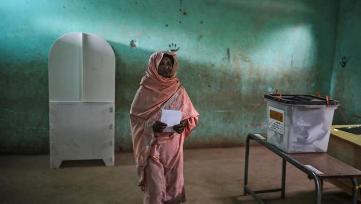AU panel finds credible elections not possible in Sudan in current climate
April 14, 2015 (WASHINGTON) – An African Union (AU) panel tasked with evaluating the pre-elections environment in Sudan concluded that it would not be possible to hold credible polls in the East African nation, recommending that the pan-African body not send a monitoring mission.

“Those who ignored this ruling either have their licenses withdrawn or arrested and detained by the National Intelligence and Security Service (NISS). Thus, freedom of expression, association and assembly were generally not respected,” the report adds.
The committee noted that it held meetings with all stakeholders including officials in the Sudanese government and the National Elections Commission (NEC), political parties, civil society groups, media representatives, candidates, Political Party Affairs Council, the Human Rights Commission, parliament, the AU-UN hybrid operations in Darfur (UNAMID), United Nations Development Programme (UNDP), AU liaison office to Sudan, Arab League, Intergovernmental Authority on Development (IGAD), African ambassadors, European Union (EU) and the troika countries’ (US, UK and Norway) ambassadors in Khartoum.
It added that asidefrom the government, NEC, representatives of public institutions, the Arab League envoy and some African ambassadors, most stakeholders wanted the AU to “distance itself from observing the elections”.
The mission led by Idrissa Kamara said the elections will take place amid “intense political polarisation”, against the backdrop of ongoing armed conflict in several parts of the country and international sanctions.
It concluded that that “the necessary conditions and environment for the holding of transparent, competitive, free and fair elections as agreed in the AU principles governing democratic elections have not been satisfied”.
“The existing government’s security measures put substantial restrictions on freedom of expression, association and assembly and do not provide an environment for free participation in the electoral process,” the report found.
The committee recommended that the AU not send an observation mission, saying that doing so “under this circumstance would not be viable and effective and would not contribute to democracy building”.
It called for the polls to be postponed in favour of furthering the national dialogue process initiated by president Omer Hassan al-Bashir last year on the basis that this would “allow more time for the creation of an enabling environment for credible, transparent and competitive elections”.
In a meeting held last week, the AUPSC brushed aside the findings and recommendations in the report and decided to send an observation mission headed by former Nigerian president Olusegun Obasanjo to monitor the three-day presidential and parliamentary electios, which got underway on Monday.
The decision drew strong criticism from the country’s rebel group, which expressed anger at the AUPSC for ignoring the recommendations of the pre-elections committee.
The country’s main opposition forces are boycotting the elections in which 15 little known candidates are challenging the incumbent. The voter turnout was very low in the first two days of the polls.
The ruling party had rejected calls by Sudanese opposition to postpone the general elections until after the national dialogue and formation of a transitional government and insists that it is a constitutional requirement that must be met.
Bashir launched the national dialogue initiative more than a year ago in which he urged opposition parties and rebels alike to join the dialogue table to discuss all the pressing issues.
But the initiative faced serious setbacks after rebel groups and leftist parties refused to join and after the National Umma Party (NUP) led by al-Sadiq al-Mahdi withdrew from the process in protest of al-Mahdi’s brief arrest last May.
Earlier this year, several political parties including the Reform Now Movement (RNM) led by Ghazi Salah al-Din and the Just Peace Forum (JPF) led by al-Tayeb Mustafa and the Alliance of the Peoples’ Working Forces (APWF) announced they had decided to suspend participation in the national dialogue until the requirements of a conducive environment are met.
Last Thursday the EU announced that it will not send a mission to observe this elections.
“When dialogue is bypassed, some groups are excluded and civil and political rights are infringed, the upcoming elections cannot produce a credible result with legitimacy throughout the country,” said a statement by EU representative of foreign affairs and security affairs and vice-president of the commission, Federica Mogherini.
“The people of Sudan deserve better. We therefore chose not to engage in support of these elections,” she added.
Canadian foreign minister Rob Nicholson echoed the same sentiments.
“Canada is disappointed by the failure of Sudan’s president, Omar al-Bashir, to deliver on his promise to hold an inclusive national dialogue in the lead-up to the Sudanese general and presidential elections,” he said in a statement.
Over the past year, Sudanese authorities have been accused of repeatedly seizing newspaper print runs, ordering political arrests, including those of opposition leaders, and hindering election activities and targeting civilians in Darfur, South Kordofan and Blue Nile.
“These actions have obstructed the emergence of a free and open democratic process and have led many opposition parties to boycott the elections. As a result, the outcome of the elections will not reflect the will of all Sudanese people,” said Nicholson.
(ST)
